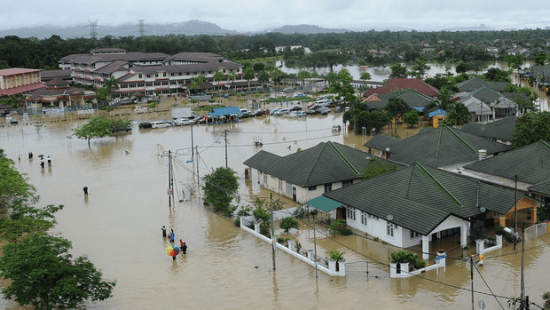Rubber entered a bull market and palm oil closed near an eight-week high as flooding across Malaysia and parts of Thailand hurt supplies of both commodities and forecasters predicted more rain.
Rubber for June delivery rallied 3.8 percent to 213.3 yen a kilogram ($1,773 a metric ton) on the Tokyo Commodity Exchange, the highest settlement since July 3. Futures rose 22 percent from a five-year low in October, meeting the threshold for a bull market with a gain of at least 20 percent. Palm oil fell 0.1 percent.

Heavy rains flooded parts of Malaysia and southern Thailand over the past two weeks, and Commodity Weather Group predicted the falls will continue for at least another week. Malaysia evacuated more than 200,000 people as of yesterday amid the worst flooding in decades. Thailandis the world’s largest rubber exporter and neighbor Malaysia is the biggest shipper of palm oil after Indonesia, where some rubber exporters are in talks with buyers to reschedule shipments because of rains.
“Key growing areas are inundated,” said David Ng, a Kuala Lumpur-based derivatives specialist at Phillip Futures Sdn., referring to palm-growing estates in Malaysia. “Delayed harvesting activities and seasonally lower production will hamper yield levels in coming weeks.”
A worker loads harvested oil palm fruit into a wheelbarrow at the Bell Eco Power Sdn…. Read More
Palm oil for March delivery dropped to 2,284 ringgit ($653) a metric ton on Bursa Malaysia Derivatives after closing yesterday at the highest since Nov. 4.
Indonesian Talks
Some Indonesian rubber exporters are in talks with buyers to reschedule shipments, Rusdan Dalimunthe, executive director of the Rubber Association of Indonesia, or Gapkindo, said in a phone interview from Jakarta today. Rubber production may drop 30 percent because of rain and floods, Dalimunthe said.
Rubber supplies in Thailand and Malaysia will contract by at least 100,000 tons a month if floods persist, International Rubber Consortium Chief Executive Officer Yium Tavarolit said yesterday. The group is the operating arm of the International Tripartite Rubber Council, which represents governments and exporters from Thailand, Indonesia and Malaysia.
Rubber futures rose 16 percent this quarter, the first advance since 2013, after Thailand, Indonesia and Malaysia took steps to shore up prices from the five-year low in October. Producer groups from the top suppliers pledged to refrain from selling below $1.50 a kilogram. Three nations also agreed to cut exports from next year to drain supplies.
‘Bad Weather’
“Bad weather in Malaysia and Thailand boosted concern that supply may tighten,” Gu Jiong, analyst at commodity broker Yutaka Shoji, said by phone from Tokyo, referring to rubber.
In Malaysia, monsoon rains with strong winds are seen over Pahang, Perlis, Kedah, northern Perak, Kelantan, central and northern Terengganu, western Johor and Sabah, and are expected to continue until tomorrow, the Malaysian Meteorological Department said on its website. All the states listed are in Peninsula Malaysia apart from Sabah, which is in Borneo.
“Above-normal rains over the past two weeks are likely to continue for at least another week, threatening crop losses” in Malaysia, Bethesda, Maryland-based Commodity Weather Group said in a daily briefing, which was dated Dec. 29.
The flood-induced rally puts palm oil futures on course for the first quarterly advance since the final three months of 2013. Prices climbed 3 percent since the end of September, paring their decline this year to 14 percent.
Output Drop
Palm oil output in Malaysia typically drops in the fourth quarter and initial months of the year, usually bottoming in January or February. Production may drop 11 percent in December, while reserves fall 4 percent, Alan Lim, an analyst at Kenanga Investment Bank Bhd., said in a report today. Declining inventory should support prices, Lim said.
The number of people evacuated in Pahang rose to 49,369 from 35,501, the Star newspaper said on its website today. The state is Malaysia’s fourth-largest palm oil producer, official data show. Twenty one people are dead and 10 more still missing after floods hit the east coast states of Kelantan, Terengganu and Pahang, the New Straits Times reported, citing Inspector-General of Police Khalid Abu Bakar.
The government will conduct a study to find out why flooding on the east coast has worsened, the New Straits Times said, citing Deputy Prime Minister Muhyiddin Yassin.
– Bloomberg


























